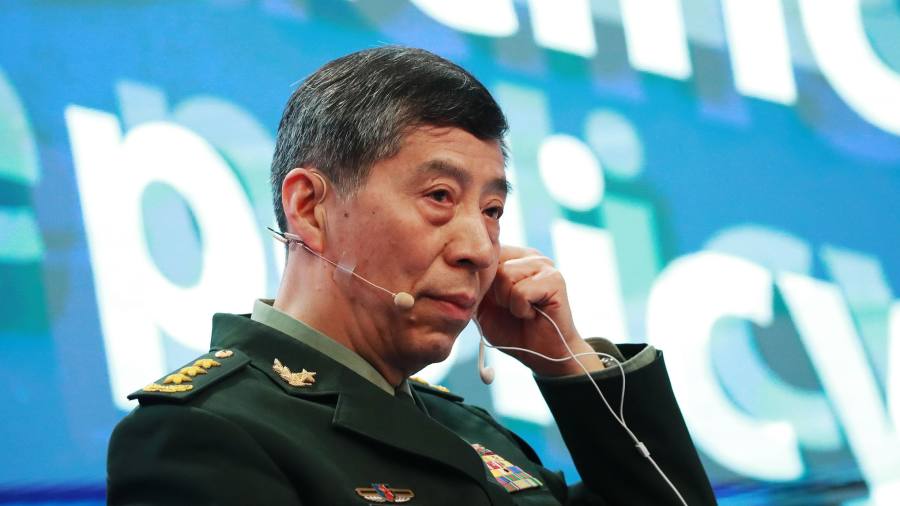China has warned western militaries to stay out of waters and airspace near its borders if they want to avoid dangerous run-ins with the People’s Liberation Army, putting on display the growing risks of unintended conflict as geopolitical competition grows.
The blunt message from General Li Shangfu, China’s new defence minister, followed a near collision between a Chinese and a US warship in international waters on Saturday. The Chinese vessel cut directly ahead of the American one as it was transiting the Taiwan Strait with a Canadian warship.
“Why does this all happen near China’s sovereign waters and airspace? Chinese ships and aircraft never go near other countries’ airspace and waters,” Li said at the annual Shangri-La Dialogue security conference in Singapore on Sunday.
“The best way to prevent this from happening is that military vessels and aircraft not come close to our waters and airspace. What does this have to do with your security? Watch your own territorial waters and airspace, then there will not be any problems.”
Li spoke a day after US defence secretary Lloyd Austin and Canadian defence minister Anita Anand used their speeches at the forum to criticise China for dangerous incidents in the air.
Austin said the People’s Liberation Army had been conducting an “alarming” number of risky aerial intercepts over the South China Sea. Anand, referring to similar intercepts of Canadian military aircraft monitoring the implementation of UN sanctions against North Korea, called China an “increasingly disruptive global power that increasingly disregards international rules and norms”.
Those rising tensions have lent a growing sense of urgency to attempts by the US to reopen military dialogue cut by China in the wake of bilateral friction over the takedown of an alleged Chinese spy balloon in American airspace in February.
Li said he met with defence leaders from 11 countries in Singapore. But breaking with tradition, Beijing refused US requests for talks with Austin on the sidelines of the forum unless Washington lifted sanctions imposed on Li in 2018 for his role in procuring weapons from Russia.
Austin on Saturday called on the PLA to engage with the US military, saying “responsible defence leaders” should be willing to talk at any time. He said dialogue was “not a reward”, a response to China’s frequent calls for the US to amend its behaviour as a prerequisite for talks.
Li claimed that communications channels remained open but added that dialogue and exchanges should be based on mutual respect. “If not even that can be guaranteed, there will not be any results,” he said.
In his first public interaction with an audience including hundreds of western defence officials, Li stuck to the usual lines of Chinese military diplomacy by pledging Beijing’s efforts to preserve peace and stability while accusing Washington of upsetting regional stability.
Chinese defence ministers are much less powerful in the overall security and military bureaucracy than their western counterparts. Although Li, who became minister in March, is a member of the Central Military Commission, the country’s top-level defence leadership, his role is limited to military diplomacy.
Echoing increasingly assertive rhetoric from Chinese leader Xi Jinping on China’s role in the global security order, Li said: “China is willing to help build a security order of an even higher standard [and] an even more comprehensive multilateral security order.”
He contrasted Beijing’s approach with what he called hegemonic and destabilising tendencies, a swipe at the US, though he did not directly mention Washington in that context.
“They are using the pretext of freedom of navigation to conduct navigational hegemony,” Li said. He also lashed out at “foreign forces using Taiwan to contain China”, which he called “the root of creating tension in the Taiwan Strait [and] the biggest troublemaker in the Taiwan Strait”.
Following Li’s speech, the Pentagon said it remained “concerned about the PLA’s increasingly risky and coercive activities in the region, including those in recent days.
“Actions speak louder than words, and the dangerous behaviour we’ve seen from the PLA around the Strait, in the South and East China Seas and beyond really says it all,” said a senior US defence official.
Read the full article here




